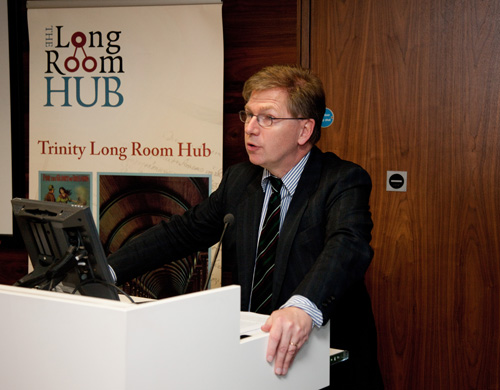New Director of Trinity Long Room Hub Gives Inaugural Address
Posted on: 08 November 2012
Professor Jürgen Barkhoff, new Director of the Trinity Long Room Hub Arts and Humanities Research Institute, recently delivered his inaugural address entitled ‘From Humboldt to Horizon 2020. What can we expect from the Humanities?’
In his lecture, Professor Barkhoff drew on the 19th century educational principles of the renowned educational reformer and philosopher Wilhelm von Humboldt which have shaped the structures and identities of modern western universities. He referred to widespread concern that recent developments in the European university landscape like the Europe wide implementation of the Bologna structures, growing managerialism, a move away from core funding to project funding, and, most recently, a reductive view that the priority of university research has to be on immediate economic benefit, are threatening to destroy the university culture connected with Humboldt’s name and that the Humanities are particularly hard hit.

Professor Jürgen Barkhoff
Against what Professor Barkhoff described as ‘an often alarmist and unnecessarily defensive stance taken by Humanities advocates’, he sought to present a more constructive way of framing the necessary debate about the future of the Humanities. This included demonstrating that there is a reformulation of the Humboldtian ideals for our time which offers the Humanities challenges, but also plenty of opportunities.
During his talk Professor Barkhoff explored the role of the Humanities in today’s world. He also emphasized the role of research institutes such as the Trinity Long Room Hub Arts and Humanities Research Institute in promoting cross- and interdisciplinary work and engaging Humanities research with wider public debate.
“We can expect and must indeed demand that the Arts and Humanities involve themselves and make themselves heard, and I see it as a prime task of an institute such as this that it fosters and enables involvement in public debate, develops a culture of engagement with the big questions that are facing us today and in doing so demonstrates the difference our research makes. This is not easy and implies, among other things, a readiness to embrace new formats of delivery and engagement, and to cultivate a language that is not only understood by our peers”.
Referring to the vision of the Trinity Long Room Hub to promote collaboration and the visibility and relevance of Arts and Humanities research Professor Barkhoff noted: “We can reflect, for example, what civic responsibility and active citizenship entails and requires in today’s crisis. And we can contribute to the upcoming decade of commemorations, which will re-examine the formative period of war, revolution and nation-building, the memory contests around its remembrance in Ireland and Europe and their impact on the way Irish and European societies interpret and represent themselves. The Irish presidency of the EU and the fortieth anniversary of Irish accession to the EU in 2013 will also give us important opportunities to discuss how Irish society positions and redefines itself in relation to the European project and the European reality”.
Professor Barkhoff also addressed the concern that Horizon 2020, the EU Commission’s main European research funding instrument to be launched in 2014 and running for five years with a budget of around 80 billion euro, will not adequately cater for the contributions the Humanities have to make in addressing crucial societal challenges.
“This is deeply worrying, not because the Humanities and Social Sciences want a bigger chunk of the cake, but because the challenges identified cannot be effectively investigated without their perspectives being an integral element of the research set-up and research process. All these challenges have to be addressed not only at the level of technology, but crucially at that of attitudes and motivations. Tackling each of them, be it health, food transport,climate action or inclusive and innovative societies depends decisively on investigating underlying social, cultural and behavioural dimensions, as it is, after all, human behaviour that has created the problems and, also has to be one key to their solution. The Trinity Long Room Hub, through its European networks, is involved in sustained efforts to influence the final shape of Horizon 2020 in this sense”.
Professor Barkhoff’s full speech can be viewed here.
About the Trinity Long Room Hub Arts and Humanities Research Institute
The Trinity Long Room Hub Arts and Humanities Research Institute was established by Trinity College Dublin in 2006 and its constituent partners are the Library and seven academic schools. These schools are the School of Drama, Film and Music, the School of English, the School of Histories and Humanities, the School of Languages, Literatures and Cultural Studies, the School of Linguistic, Speech and Communication Sciences, the School of Religions, Theology and Ecumenics, and the School of Social Sciences and Philosophy. Professor Jürgen Barkhoff was appointed as new Director of the Trinity Long Room Hub in July 2012. He is a Professor of German and specialist in German Literature and Culture in the School of Languages, Literatures and Cultural Studies. As Director of the Trinity Long Room Hub, he will lead its development as a unique resource to foster and support innovative interdisciplinary research in the Arts & Humanities, to showcase the relevance of Arts and Humanities research, and to connect this research with the exciting debates on society and culture and the great challenges Ireland and the world are faced with today.
